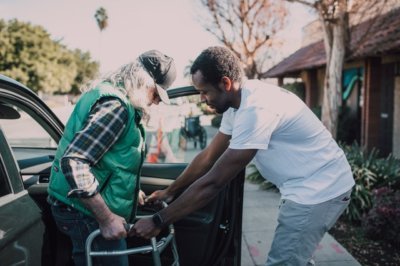Antes de ayudar a una persona con discapacidad, pregúntale si necesita ayuda | Before helping a person with a disability, ask him/her if he/she needs help ♿
 Fuente
Fuente
¡Hola! Si has leído antes mi blog debes saber que poseo una discapacidad, en caso contrario te cuento que sí. Tengo una discapacidad motora. Utilizo una silla de ruedas para desplazarme. Al igual que tú hay un montón de cosas que puedo hacer por mí mismo y otras tantas que no, en esos casos solicito ayuda. Esa ayuda de forma habitual me la brinda mi madre, a veces pido ayuda a algún amigo y también me ha tocado confiar en la buena voluntad de algún extraño.
El consejo que te quiero dar hoy es que cuando veas que una persona con discapacidad pueda necesitar ayuda, siempre, en la medida de lo posible, pregúntale antes si quiere tu ayuda y cómo podrías ayudarla.
No creas que es una cuestión de soberbia o de ser malagradecidos. Como personas con discapacidad cada día es una búsqueda constante de autonomía e independencia. Nos gusta hacer las cosas por nosotros mísmos, quizá nos cueste un poco más de esfuerzo y tiempo que a ti, pero al final nos satisface hacerlo. Así que antes de saltar al rescate, pregunta.
Hello! If you have read my blog before you must know that I have a disability, otherwise I will tell you that I do. I have a motor disability. I use a wheelchair to get around. Like you there are a lot of things I can do by myself and many others that I can't, in those cases I ask for help. That help is usually given to me by my mother, sometimes I ask a friend for help and I have also had to rely on the good will of a stranger.
The advice I want to give you today is that when you see that a person with a disability may need help, always, as far as possible, ask them beforehand if they want your help and how you could help them.
Don't think it is a matter of arrogance or being ungrateful. As people with disabilities every day is a constant search for autonomy and independence. We like to do things for ourselves, it may take a little more effort and time than it does for you, but in the end we are happy to do it. So before you jump to the rescue, ask.

¿Porqué preguntar?
Sencillo. Como te dije quizá la persona está aprendiendo como realizar una tarea específica por su cuenta. Se está probando y necesita ir un poco más allá de lo que hace habitualmente, en ese momento no necesita ayuda.
Por ejemplo, en una ocasión unos amigos me estaban enseñando a trasladarme por mi cuenta desde la silla de ruedas hasta el asiento de un automóvil (nada sencillo para mí). Aún me cuesta bastante. En ese momento la gente pasaba y pensaría “que desconsiderados, no ayudan a esa persona”. Algunos ofrecían su ayuda y de forma amable les tenía que decir que no, pero que gracias. Para algunos puede parecer un sinsentido, dirán “yo lo hago por ti y te ahorras el esfuerzo”. Para una persona con discapacidad tratar de hacer cada cosa por sí mismo tiene todo el sentido del mundo.
Otra razón por la cual debes preguntar antes de ayudar de manera espontánea a una persona con discapacidad es que deconoces su estado físico. Por ejemplo, si ves a una persona con discapacidad caída o tratando de sortear algún obstáculo en la vía, es necesario preguntar, quizá necesites que ella te diga de forma precisa cómo sujetarla o levantarla para evitar lesiones físicas, además de por respeto al intentar tocar el cuerpo de otra persona.
Why ask?
Simple. As I told you maybe the person is learning how to perform a specific task on their own. He is testing himself and needs to go a little beyond what he usually does, at that point he doesn't need help.
For example, I once had friends teaching me how to transfer myself from a wheelchair to a car seat (not easy for me). I still have a hard time. At the time people would walk by and think "how inconsiderate, they don't help that person". Some would offer their help and I would have to politely tell them no, but thank you. For some people it may seem senseless, they will say "I'll do it for you and save you the effort". For a person with a disability trying to do every single thing for themselves makes all the sense in the world.
Another reason you should ask before spontaneously helping a person with a disability is that you don't know his or her physical condition. For example, if you see a person with a disability falling or trying to get around an obstacle in the road, you need to ask. You may need to ask them to tell you precisely how to hold or lift them to avoid physical injury, as well as out of respect for trying to touch another person's body.

En resumen
Siempre pregunta antes de ayudar. Con empatía y educación. Eso nos hace valorar mucho más tu cooperación ya que vemos en ti disposición, solidaridad, pero también respeto por nuestra autonomía, por nuestros propios ritmos.
Seguro que conoces a una o varias personas con discpacidad, comenta con ellas este tema y luego me cuentas a mí lo que piensan todos.
In summary
Always ask before helping. Be empathetic and polite. That makes us value your cooperation much more because we see in you willingness, solidarity, but also respect for our autonomy, for our own rhythms.
Surely you know one or more people with disabilities, discuss this issue with them and then tell me what they all think.


Traducción realizada con DeepL Translate
Imagen de agradecimiento y separadores hechos en Canva